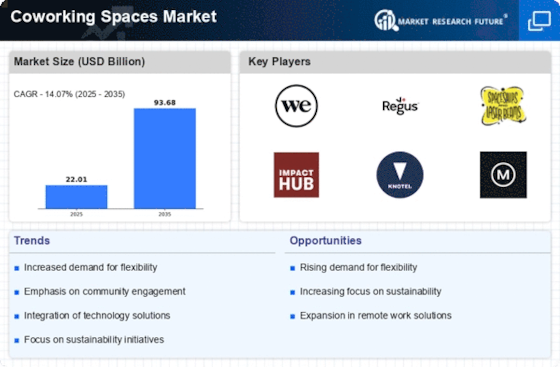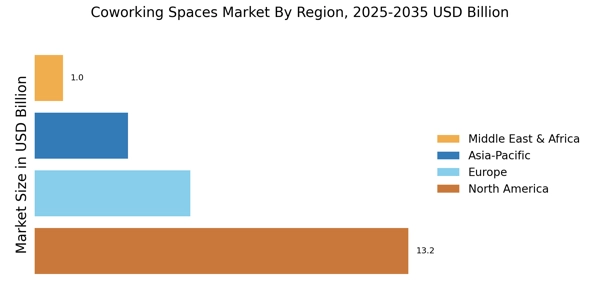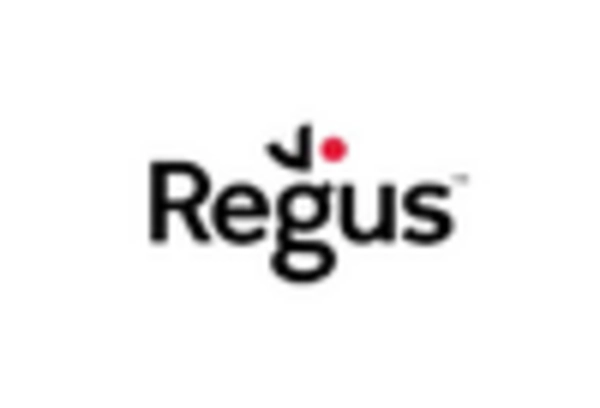Diverse Membership Options
The Coworking Spaces Market is characterized by the introduction of diverse membership options that cater to a wide range of professionals. From freelancers to large enterprises, coworking spaces are adapting their offerings to meet the varying needs of their clientele. This flexibility allows individuals to choose plans that align with their work habits, whether they require a dedicated desk, private office, or simply access to communal areas. Recent trends indicate that coworking spaces with varied membership structures are more successful in attracting a diverse clientele, leading to increased revenue streams. Additionally, this adaptability fosters a sense of community, as members from different backgrounds and industries interact and collaborate. As the Coworking Spaces Market continues to evolve, the ability to offer tailored membership options will likely remain a key driver of growth.
Technological Advancements
Technological advancements play a crucial role in shaping the Coworking Spaces Market. The integration of high-speed internet, cloud computing, and collaborative tools has transformed how individuals and teams operate within coworking environments. These technologies facilitate seamless communication and collaboration, making coworking spaces more appealing to startups and freelancers. Data indicates that coworking spaces equipped with advanced technology attract a higher number of members, as they provide essential resources for productivity. Furthermore, the rise of virtual reality and artificial intelligence may further enhance the coworking experience, offering innovative solutions for workspace management and member engagement. As technology continues to evolve, the Coworking Spaces Market is likely to adapt, ensuring that these spaces remain relevant and competitive in a rapidly changing landscape.
Rise of Remote Work Culture
The Coworking Spaces Market is experiencing a notable rise in demand due to the increasing prevalence of remote work. As organizations adopt flexible work arrangements, employees seek environments that foster productivity outside traditional offices. This shift has led to a surge in coworking spaces, which offer amenities tailored to remote workers. According to recent data, the number of coworking spaces has expanded significantly, with estimates suggesting a growth rate of approximately 20% annually. This trend indicates that businesses are recognizing the value of providing employees with diverse work environments, thereby enhancing job satisfaction and retention. The Coworking Spaces Market is thus positioned to benefit from this evolving work culture, as more individuals and companies embrace the flexibility and community aspects that these spaces provide.
Urbanization and Population Growth
Urbanization and population growth are significant factors influencing the Coworking Spaces Market. As more individuals migrate to urban areas in search of employment opportunities, the demand for flexible workspaces has surged. Coworking spaces are strategically located in city centers, making them accessible to a growing workforce. Data suggests that urban areas with high population density are witnessing a rapid increase in coworking facilities, as businesses seek to capitalize on the influx of professionals. This trend not only supports the growth of the Coworking Spaces Market but also contributes to the revitalization of urban environments. Furthermore, as cities continue to expand, the need for innovative workspace solutions will likely intensify, positioning coworking spaces as a vital component of the urban landscape.
Increased Focus on Work-Life Balance
The Coworking Spaces Market is witnessing a growing emphasis on work-life balance among professionals. As individuals seek to harmonize their personal and professional lives, coworking spaces offer an ideal solution by providing flexible working hours and environments that promote well-being. Many coworking facilities now incorporate wellness programs, fitness areas, and relaxation zones, catering to the holistic needs of their members. This trend aligns with the broader societal shift towards prioritizing mental health and well-being in the workplace. Market data suggests that coworking spaces that prioritize work-life balance experience higher occupancy rates, as they attract members who value a supportive and balanced work environment. Consequently, the Coworking Spaces Market is likely to continue evolving to meet these demands, ensuring that it remains a viable option for modern professionals.

















